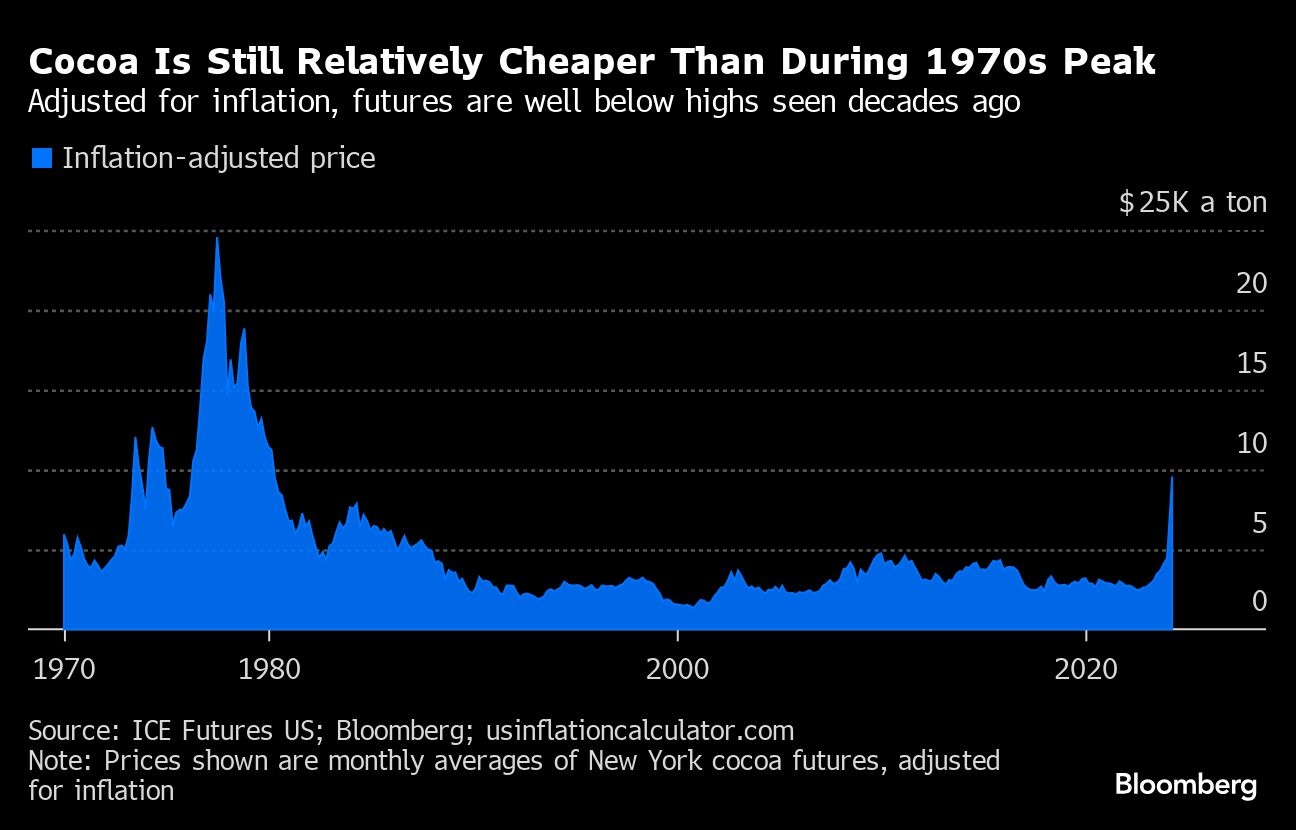Why the world of chocolate is in crisis
The world of chocolate is facing such immense cocoa shortages that the wild trading lured an unlikely player: Pierre Andurand, a hedge-fund manager best known for his bets on oil.
By early March, prices had already more than doubled in just a 12-month span. At that point, many speculators were calling it quits and slashing their bullish wagers. That’s when Andurand saw an opportunity to go long.
The signs were all there for a massive deficit: the world had enjoyed chocolate on the cheap for decades, trees were older and crop disease was rampant in the West African countries that supply about half the market. A bit of bad weather was the tipping point for output from Ivory Coast and Ghana, with many traders now fearing production in the growers has entered a long-term retreat. Futures quickly surged about 70 per cent from the start of March to a record this week.
For the world’s chocolate makers, the crisis is here. Plants have been forced to shutter from Malaysia to Germany and Chicago. Firms that were caught on the wrong end of the rally are getting snarled in lawsuits. And now, a lack of liquidity also means that the market’s next stage is likely to be riddled with erratic price moves that raise the specter of company failures.
“The scars of this crisis may long be visible in cocoa’s volatility,” said Tristan Fletcher, chief executive officer at ChAI, a platform that uses AI to analyze commodity markets. “Speculative players are coming in and out of positions much more rapidly, which will add to this choppiness. This means that the markets are much more likely to swing violently.”
Commodities markets are notoriously volatile, but the speed and severity of the rally in cocoa has caught out even seasoned market players and triggered chaos across the global supply chain for the crop, from struggling West African farmers to European commodity brokers to U.S. candy manufacturers.
This week, futures reached a record US$10,760 a metric ton, a level that would’ve previously been unthinkable for most traders and is about double the previous peak set in the 1970s. Before this rally, the New York market had largely remained below $3,500 since the 1980s.
Citigroup Inc. sees prices climbing to as high as $12,500 in the next few months. Andurand has forecast futures to break $20,000 this year. The oil trader’s hedge fund took a small-sized long position in cocoa in early March, a person familiar with the matter said earlier this month.
The torrid pace of the increases has driven out scores of investors who don’t want to get caught flat-footed. And more importantly, many can no longer afford to trade — the cost for margin calls to back a firm’s position has skyrocketed.
Trading of cocoa futures has reached historically low levels, with a measure of the amount of outstanding contracts slipping to the lowest in 12 years. The market is now stuck between extreme crop shortages and dangerously low liquidity.
“It is the lack of physical activity — confined only to desperate covering of nearby physical contracts — that has caused the drying up of their normal futures activity, reducing the liquidity,” said Pam Thornton, a veteran commodity trader at Nightingale Investment Management, who’s best known for her role at former cocoa hedge fund Armajaro Asset Management. “So if you have to buy futures, you can easily move the market very quickly.”
When firms can’t pay margin calls to back up their hedges, they are forced to buy futures back, sending prices even higher and pushing even more people out of the market. That vicious circle of distress was also seen in recent years during the nickel meltdown and when European natural gas prices spiraled out of control following Russia’s invasion of Ukraine, rippling out to consumers, manufactures, currencies and economies.
“That’s what worries me the most,” said Jacques Torres, founder and chief executive officer of New York-based Jacques Torres Chocolate, an artisan candy maker. “If this is the future, then we are going to see a lot of people out of business.”
Double-digit production declines are forecast for cocoa crops in Ivory Coast and Ghana, which account for about 50 per cent of supplies. The shortage is so severe that both countries are rolling contracts to future harvests.
The International Cocoa Organization (ICCO) predicts production will trail demand by 374,000 metric tons in the 2023-2024 season, the third straight shortfall. Chocolate maker Barry Callebaut AG sees a deficit of 500,000 tons, equal to about a 10th of the global market, and the company sees another shortfall next year.
Andurand has said his firm expects global cocoa bean production to decline by at least 18 per cent on an annual basis.
“We have almost nothing more to offer for the rest of this season,” said Nicholars Quartey, 67, who cultivates 12 acres of the crop in the town of Suhum, about 100 kilometers north of Ghana’s capital of Accra.

Production is highly concentrated in Ivory Coast and Ghana, which leaves the market very vulnerable to what’s happening to crops in those countries. Output in Nigeria and Cameroon has been stuck in a small range for a long time, and rivals in Asia have seen declines. What’s happening in cocoa is now a wake up call for the coffee industry, which has seen production concentrate in just two countries: Brazil and Vietnam.
The historic cocoa shortage also reveals other problems that have plagued the region.
For decades, farmers in Ivory Coast and Ghana were chronically underpaid. While futures have surged in nominal terms, they haven’t kept up with the pace of inflation. That’s even 12 years after Ivory Coast nationalized its cocoa sector as a way to improve farmer livelihood — a condition for receiving debt relief from the International Monetary Fund following a 2011 civil war.
Prices offered to growers are set by governments in both countries, which locks in sales a year in advance. As a result, growers are being paid way less than the prices set in the international market and can’t respond nimbly to supply and demand changes.
“What you’ve got to do is give the farmer a signal that, come the next main crop, it’s worth investing in his farm and investing a lot more than he has done in recent times,” said Steve Wateridge, head of research at Tropical Research Services.
Ghana and Ivory Coast recently did raise some prices for farmers, but it’s yet to be seen whether the increase was enough to encourage more supply.
Few producers have access to irrigation or modern farming techniques, making them vulnerable to the weather. They also haven’t had enough money to invest in fertilizers and other crop chemicals after prices surged in recent years.
Meanwhile, there’s been a lack of innovation for the plants. Because cocoa is a tree crop that can last for 25 years and isn’t planted for each harvest like corn or soybeans, there’s little incentive for companies such as Syngenta AG to invest in producing better seeds. And back in 2018, when the world was facing a surplus, Ivory Coast stopped the distribution of a new seedling that would offer higher-yielding, more resistant trees.
“I know so many farmers who are leaving the cocoa sector: They’re abandoning their cocoa farms and going to rubber plantations — others are going to coconut plantations,” said Issifu Issaka, who farms cocoa on 12 acres in Ghana. He also points to an upsurge in small-scale mining in the area, known locally as galamsey, that’s polluted the water.
“The water bodies in the cocoa growing regions have gone — we’ve lost them,” Issaka said.

Consumers have yet to see the full impact of the rally. Godiva’s parent, London-based Pladis Foods, is still finalizing pricing plans but expects percentage increases globally to average in the “high single digits,” according to Chief Executive Officer Salman Amin.
Growers in places like Cameroon, Nigeria, Ecuador and Brazil — where prices aren’t controlled by governments — are taking steps to increase output.
“With this cocoa price, the fever has set in,” said Laerte Moraes, a managing director for Cargill Inc.’s South American food ingredients unit.
Still, new deforestation regulations in the European Union — a major consumer — are exacerbating the difficulties for farms to expand. It’s also unclear how much cocoa will be able to reach European shores, putting more pressure on already declining exchange-certified stockpiles. It’s those beans that back benchmark futures traded in London.
It’s going to be some time before any new production hits the market. Cocoa trees can take between three to five years before they start yielding crops. By that point, it may be too late for some candy makers to recover.
“A lot of the smaller players — the bean to bar guys, the chocolatiers — they are beyond stressed,” said Judy Ganes, president of J Ganes Consulting. “For those players, they might just disappear.”








